November 15, 2018 – All the experts agree on two things about the Croatian medical tourism industry: it has huge potential, and all stakeholders must come together to make it happen. Can they?
If ever there was a golden opportunity to be exploited, this is it. And the main thing which is holding Croatia back from building a potential billion-dollar industry is focus and coordination of private business and Croatian State institutions, whose very mandate is to make initiatives like this happen.
Without giving away too many State secrets, I don’t think it is major news that many State officials are more concerned about maintaining their position and not working too hard than actually doing the job that they are paid to do. Not a criticism, but a fact. In fact, this article is not aimed to criticise, but rather an experiment to see if Croatian officials and institutions can rise above their own self-interest and narrow viewpoints to come together to build an industry which all experts agree has massive revenue potential for Croatia, an industry experts say Croatia can be among the best in the world. And they all agree that the main thing holding Croatia back from developing its medical tourism into a global player is… Croatia itself, and its inability to unite for the common good – the subject of a recent TCN editorial. Croatia and its inability to unite in anything unless Croatia is being attacked.
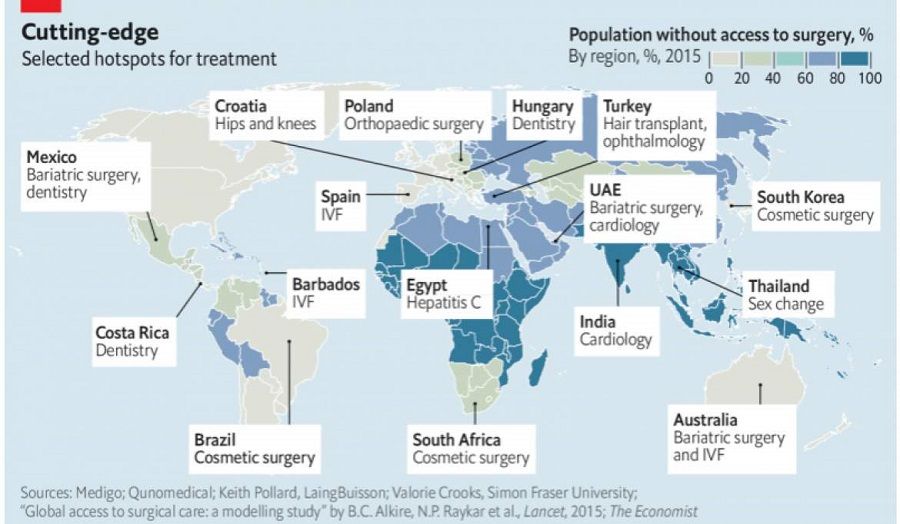
(The Economist has Croatia on the global medical tourism map)
The Croatian economy is in severe trouble, its youth emigrating en masse, and its politicians more interested in keeping things as they are than making a positive change. There is so much skepticism here about the ability to get things done for the common good rather than the private interest, but this golden opportunity with medical tourism offers us all an opportunity to publicly and transparently see if our elected and employed officials have any interest in doing the jobs they are well-paid to do to play their part in bringing this initiative forward. The potential of Croatia’s medical tourism is not a secret to the authorities – the Director of the Croatian National Tourist Board picked up an award for it at last year’s HTI conference.
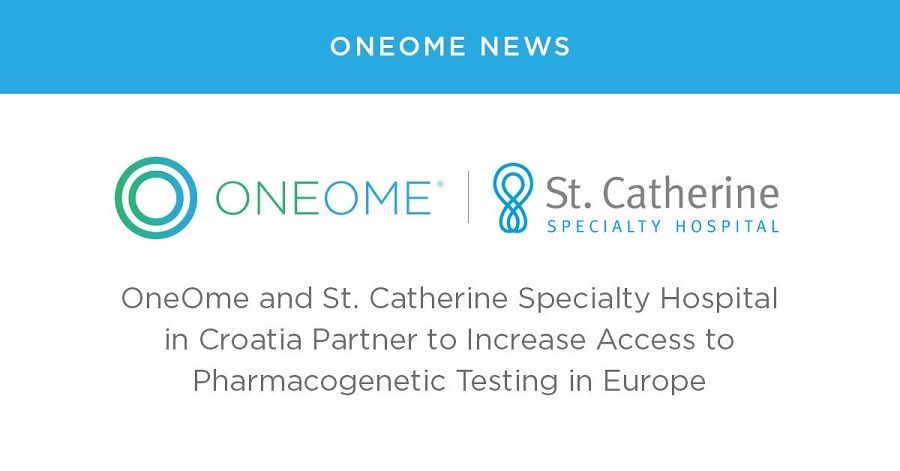
(Co-founded by Mayo Clinic, OneOme has partnered with Croatia’s St Catherine Specialty Hospital to increase access of its groundbreaking pharmacogenetic testing in Europe. Learn more here.)
Below I will paint the picture of the opportunity through the eyes of global experts, all of whom have been in Croatia in the last month supporting Croatia’s medical tourism industry. After that, I will show exactly how it can be done through a real-life example of a country which was also having unity issues, but which is now regarded as the best medical tourism destination in the world. Finally, I will be sending this proposal to the various tourism, business and health stakeholders in official positions, inviting their participation and feedback, and then publicly providing an update on who is, or is not, interested in working to realise this outstanding opportunity for Croatia.
Part 1 – Croatian Medical Tourism – What do the Global Experts Think?
“Croatia COULD – if it really got its act together – it could take 25% of the Hungarian dental tourism business, if it got together and did things properly. I don’t see why not. I come here a lot. I like Croatia very much.” Keith Pollard, Editor in Chief of International Medical Travel Journal. Read TCN’s interview with Keith at the Crikvenica International Healthcare Tourism conference last week.
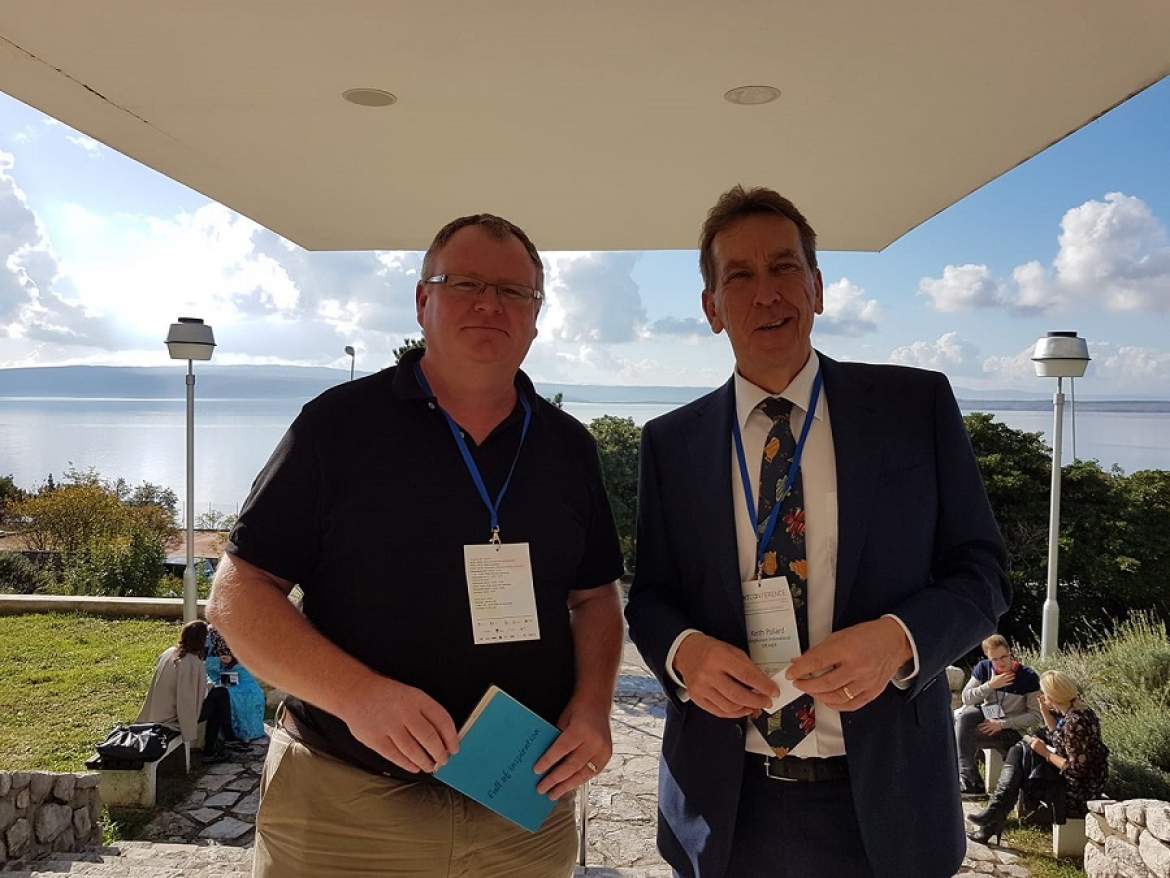
(Keith Pollard, left, Editor in Chief of International Medical Tourism Journal, with TCN in Crikvenica last week)
“This industry is huge, and rising. The official number touted around is that medical tourism is about $60 billion globally, but nobody is truly tracking the numbers, and this number comes from planned medical tourism trips. In India, for example, there are so many Indians outside the country who return home and have medical procedures. If we include these numbers, the figure must be well over $100 billion a year. Croatia can get a nice piece of that.” Dr. Prem Jagyasi, global medical travel speaker, in an interview with TCN at the Adriatic Health and Tourism Investment conference in Zagreb recently. Read the full interview with Dr. Prem.
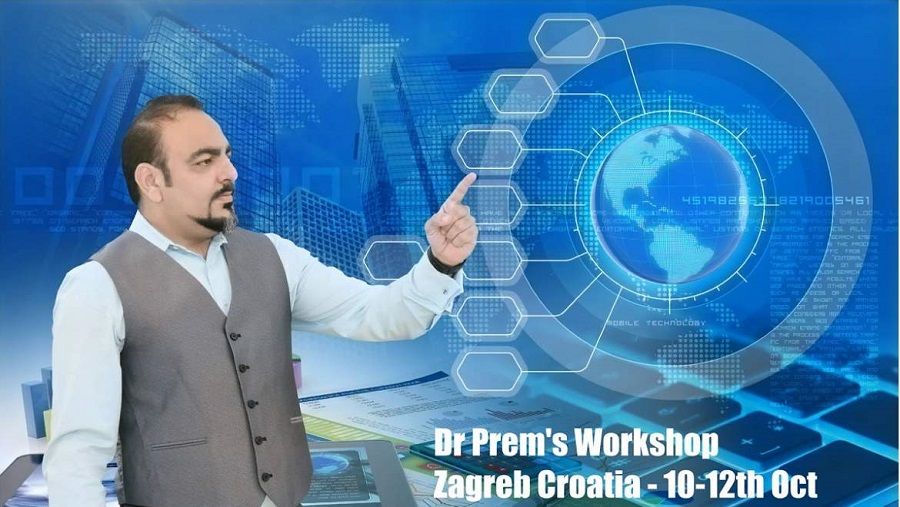
(Dr. Prem Jagyasi took part in the 2nd Adriatic Health and Tourism Investment conference in Zagreb last month)
Where could Croatia be in 5 years?
“Without doubt in the top 10 medical tourism countries in the world, if they get themselves properly organised.” Drl. Prem Jagyasi, in the interview above.
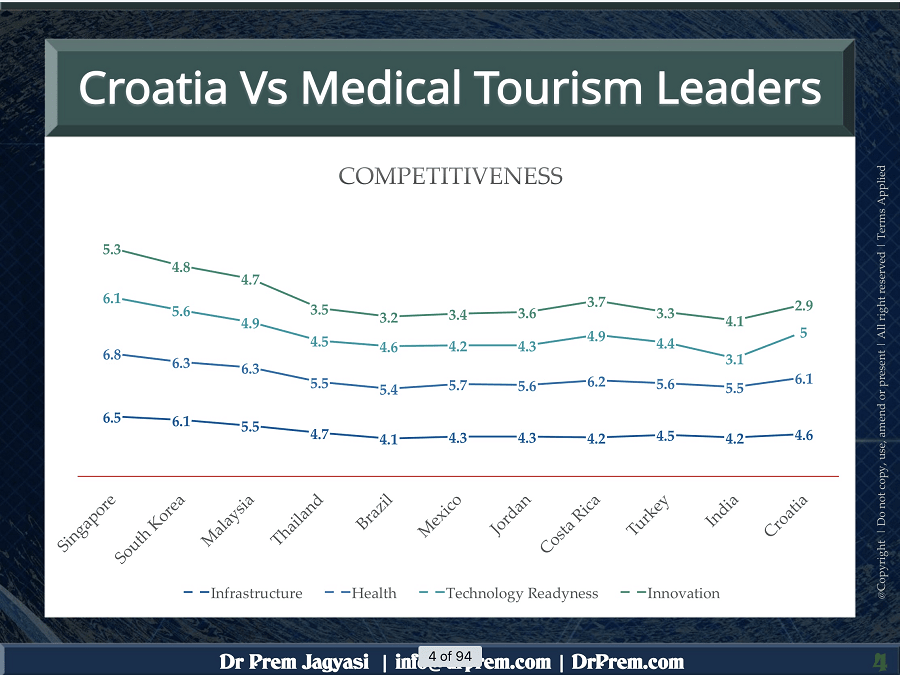
“The main lesson I learned from my travels and visits to medical tourism destinations and hospital inspections: Collaborate or die. Malaysia was no different from Croatia, they had to face the decision of being serious about the business, or just being a bunch of hospitals competing with each other. A bunch of hospitals competing with each other doesn’t help any country in creating a solid brand for its medical tourism industry.” Global medical travel branding guru Ilan Geva in Crikvenica. Read the full TCN interview with Ilan here.
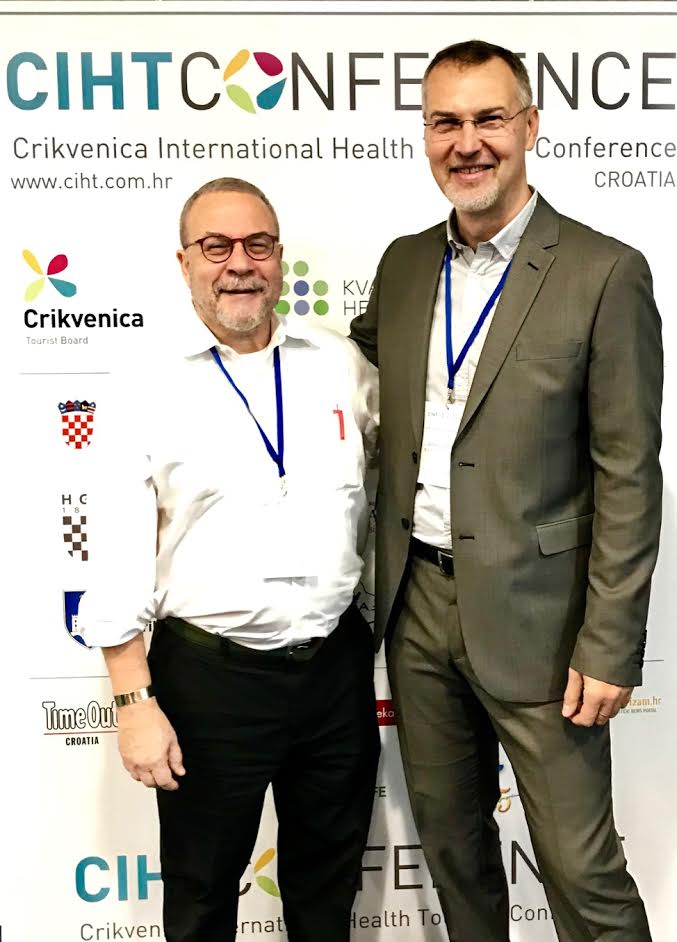
(Ilan Geva, left, at the Crikvenica International Health Tourism conference last week)
“The role of the politicians is to make the legislation easier, find a budget for health tourism, and then get out of the way.” Ilan Geva.
“Malaysia overcame the obstacle of politics, budget allocation, and legal implementation and made sure that all stakeholders know exactly what they are supposed to do within the medical tourism activity. Clear, transparent and efficient. Croatia is still miles away from that situation. Building a national brand is impossible under these circumstances because there is no brand…only a bunch of providers spread all over the country.”
“One of the most common sentences I hear in Croatia (as well as in other Eastern European countries) is the sentence: “We have no budget”. That has to change immediately. No one gains anything with no investment. I heard that there is actually money being spent already, the question is who spends it, on what, is it transparent, and does it deliver a clear benefit to all Croatian medical tourism practitioners. Some people complained that the Zagreb Tourist Board has commissioned an American association to do a research, or feasibility study well over a year ago paid a six-figure amount (in U.S. Dollars) and yet no one has seen anything. That doesn’t contribute to the effort of building a consensus and collaboration in this industry.” Ilan Geva.
Notice one common theme? Coming together. Getting its act together.
Where Does Croatia Look to Learn Lessons about Developing Its Health Tourism Industry?
“Malaysia without a doubt is the country which has got it together. We have the IMTJ awards and Malaysia has won Destination of the Year three out of four times. They have managed, somehow, perhaps because of the culture, to get all the bodies and stakeholders together. I have been there and been through the process, and it is real.” Keith Pollard, Editor in Chief of International Medical Travel Journal.
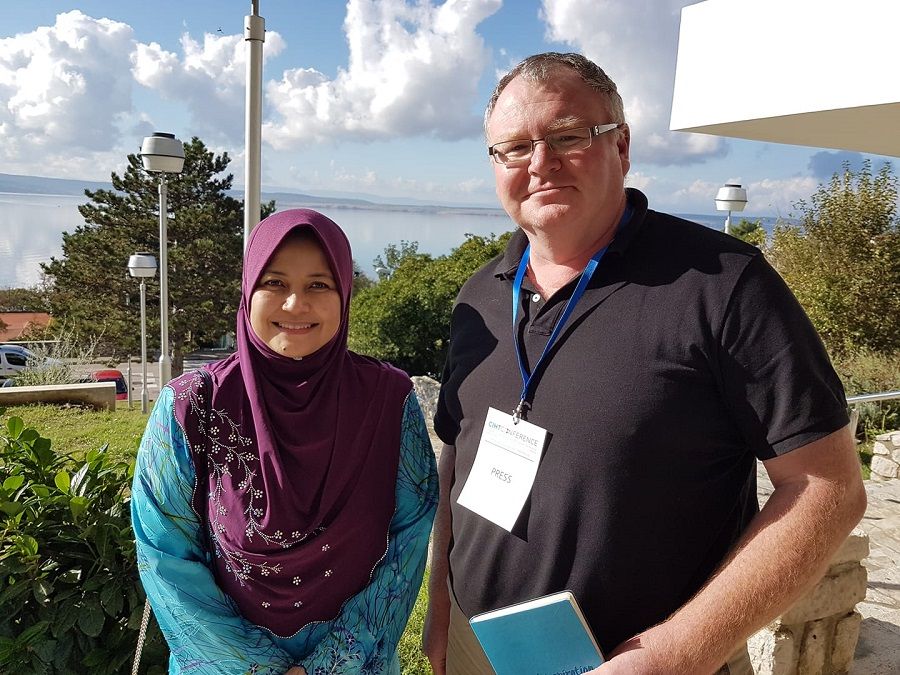
As luck would have it, Sherene Azli, CEO of the Malaysian Healthcare Travel Council, which runs the most successful medical tourism in the world, according to recent IMTJ (and other) awards, was also a keynote speaker in Crikvenica, and Sherene kindly agreed to an interview with TCN, which you can read in full here.
The key to Malaysia’s success is unity and togetherness. Sherene runs MHTC as a public-private company within a department of the Ministry of Health, reporting directly to the Ministry of Finance. She coordinates all the stakeholders involved, which takes up 90% of her working hours, with the result that from the moment the patient arrives at the dedicated medical tourism arrivals lounge at a Malaysian airport until the moment of departure, all stakeholders are working to provide the very best service to that patient. As Sherene wrote:
“The reality is, it can only be done TOGETHER with all our stakeholders. Hence our tagline of #kitamenangsamasama which means #wewintogether #MHwinstogether.”
As Ilan Geva noted above, Malaysia has succeeded but the process was far from easy. But it can be done. My question to the stakeholders in Croatia (look at the agencies in Malaysia pulling together in the slide above), can it be done in Croatia? Are you ready to work for the good of Croatia, to provide wealth and jobs, to make Croatian medical tourism one of the top 10 – or better – in the world?
What is Happening with Croatian Medical Tourism at the Moment?
To say that nothing was being done would be incorrect – there is a LOT happening on the ground. To say that it was in any way coordinated however…
There is a video…
The Croatian National Tourist Board explained in Crikvenica that it had invested 4 million kuna in medical tourism, without providing details. As Ilan Geva noted above, the Zagreb Tourist Board has apparently spent at least $100,000 on a special study of medical tourism, but no more details are available. The Ministry of Tourism speaks of the importance of medical tourism and it being included in a strategic document, again without any specific details. I am sure that the Ministry of Health has a position on all this as well, but I have not been able to ascertain it.
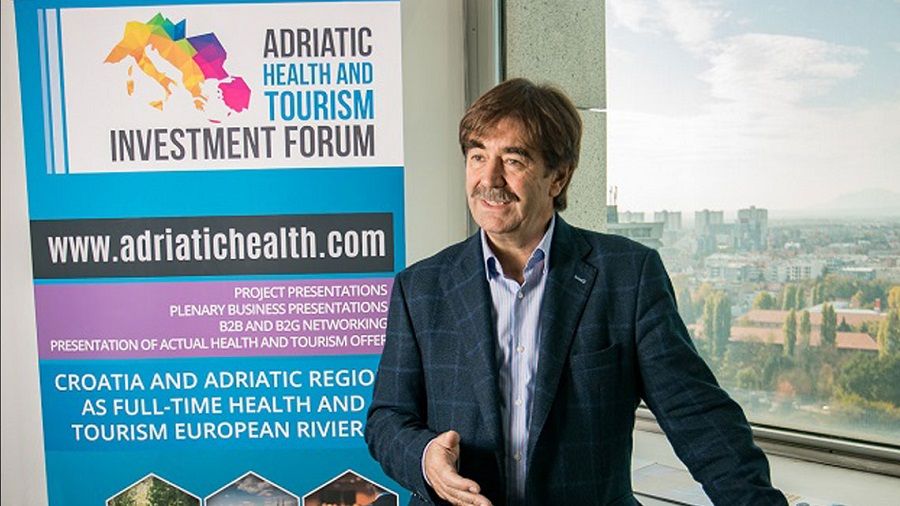
(There is plenty of intereest and energy in promoting the Croatian medical tourism industry, if only there was a coherent strategy. Miljenko Bura, organiser of the 2nd Adriatic Health and Tourism Conference in Zagreb)
Private clinics have been moving ahead, frustrated at the lack of official coordination. The Kvarner Health Cluster is the most globally recognised, but there are other health clusters as well, notably in Zagreb. Some private clinics are making real inroads on the international stage – St Catherine Specialty Hospital, Bagatin Clinic and Svjetlost, and their marketing investments for private businesses are huge. The problem, as Ivan Gabric of Svjetlost said in Crikvenica is that “a private business cannot brand a destination.”
Various, fragmented initiatives, all of which result in one thing – confusion about the Croatian medical tourism market internationally, no cohesion, and clinics and regions battling against each other, rather than trying to win together to establish Croatia as a premier health tourism brand.
What if – close your eyes for a minute and imagine this – all the Croatian stakeholders came together, Malaysian-style, #zajednopobijedjemo?
Who are the Key Stakeholders to Develop Medical Tourism in Croatia?
I am, of course, not an expert, but my initial list would include:
- The various health clusters already in existence
- The main clinics
- Croatian National Tourist Board
- Zagreb Tourist Board
- Other regional tourist boards
- Key hotel groups
- Ministry of Tourism
- Ministry of Health
- Ministry of Economy
- Ministry of Finance
- Croatia Airlines
- Zagreb Airport
- Representative for the Croatian diaspora, a major medical tourism potential market
- Media/PR/Marketing reps to help brand, promote and tell the story
What are the Next Steps for Medical Tourism Development in Croatia?
Assuming we all want to win together, Malaysian-style, here are the next steps I would take, having watched the industry quite closely over the last few weeks:
1. Bring all interested clinics and clusters together to brainstorm and agree what it is that the medical tourism sector can offer.
2. Then bring the stakeholders together to brainstorm on the potential directions.
3. Appoint an independent and capable leader to run the project, with an agency which is independent and reports to one ministry only. Give that person authority and a budget.
4. Go on a fact-finding mission to Malaysia, to learn as many lessons as possible.
5. Go on a second fact-finding mission much closer to home. To Budapest, and learn how the phenomenal Hungarian dental tourism industry operates.
6. Get the stakeholders together to brainstorm on how to implement the Malaysian and Hungarian models in the Croatian context.
I would also include in the planning a provision of some tax or percentage profit to go from the private medical tourism sector, if it is supported as above, to be paid to the public healthcare system. That way, if Croatia works to develop its medical tourism industry, the medical tourism industry can boost the coffers of the public healthcare system. As they say in Malaysia, We Win Together.
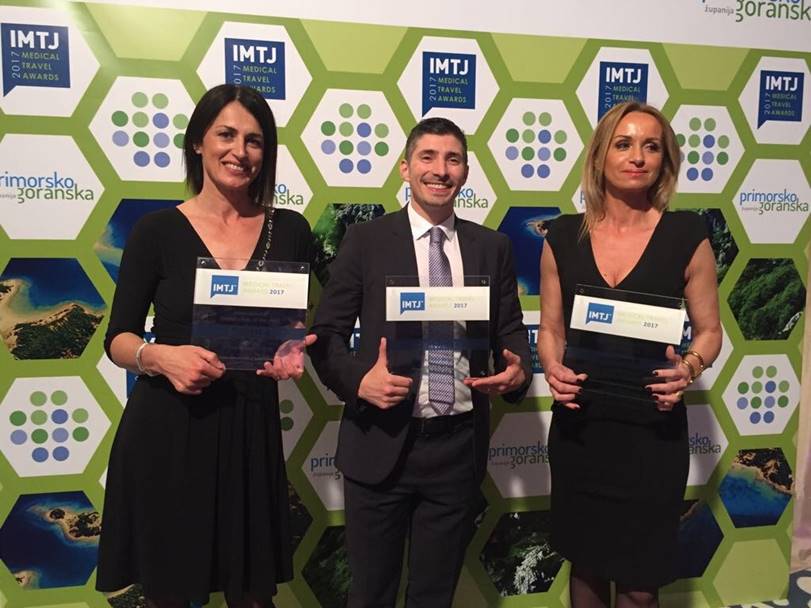
(Croatian health tourism quality on the international stage – IMTJ award winners, Rident, Bagatin Clinic and St Catherine Specialty Hospital)
“The biggest challenge is the lack of vision. Where we want to be as a destination in 2025 or 2030 is the key point to position Croatia as the top medical tourism destination in the future. We need to know where we are going and how we can get there. We have great clinics in Croatia, but nobody knows about us internationally and this we can change if we work together (Public and private sector) on positioning Croatia as a European medical tourism hub. ” Ognjen Bagatin, CEO of Bagatin Clinic.
The private medical tourism sector is ready to move forward with this process to put Croatia in the top ten on the global map. Let’s find out if Croatia’s state institutions are equally motivated. I will send this article with an invitation of collaboration to the various stakeholders, and report back on progress in due course.
If you would like to get involved with this initiative to promote Croatian medical tourism, contact us at [email protected], with Subject – Health.
To follow the latest TCN coverage of medical tourism in Croatia, click here.









